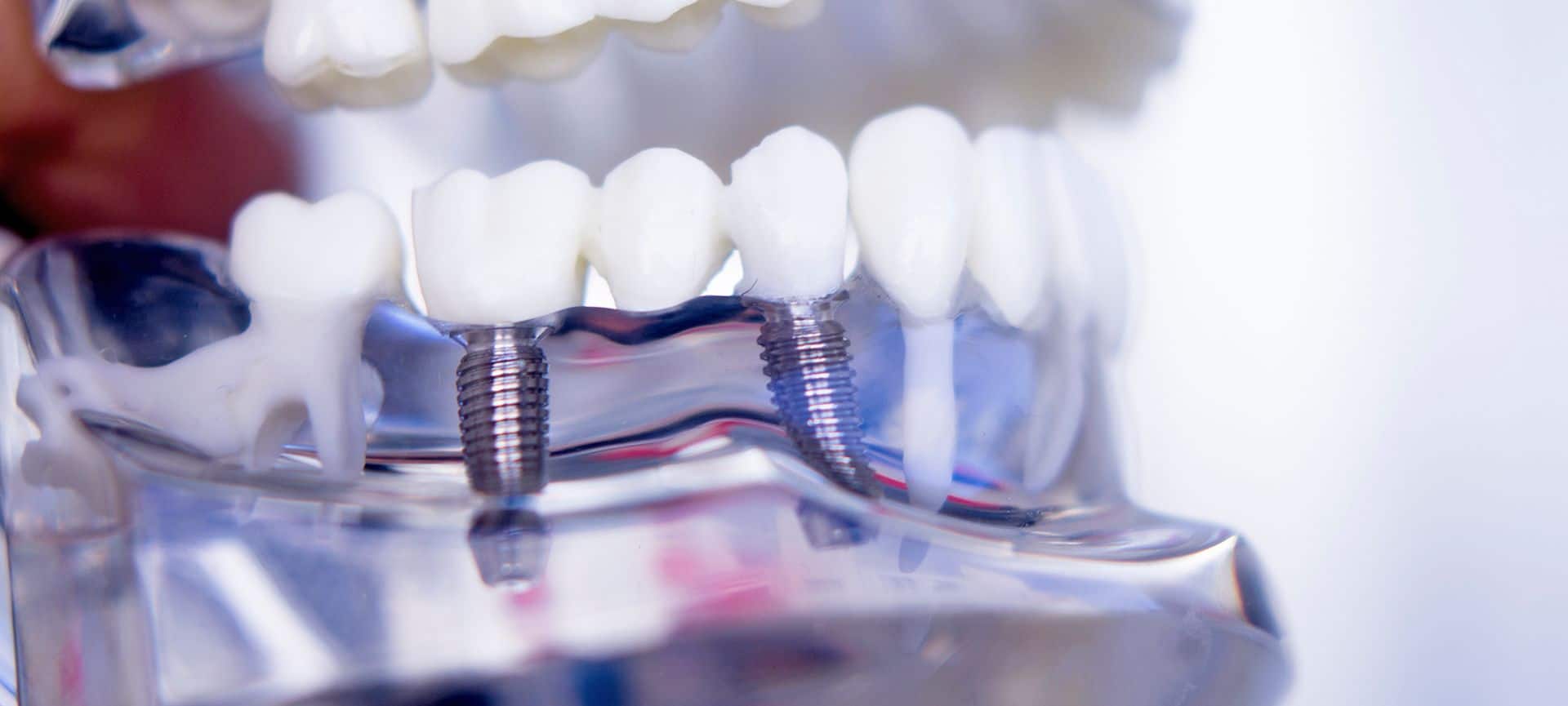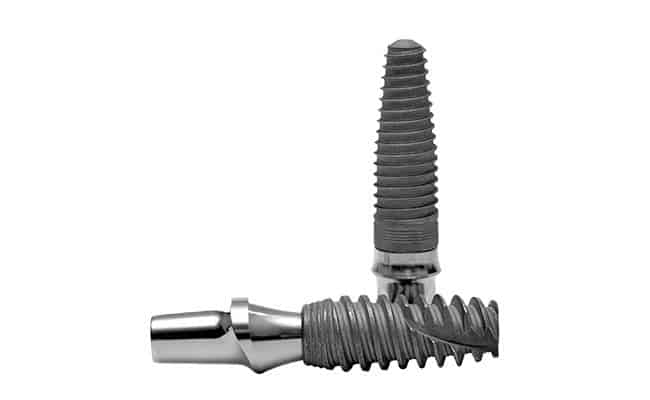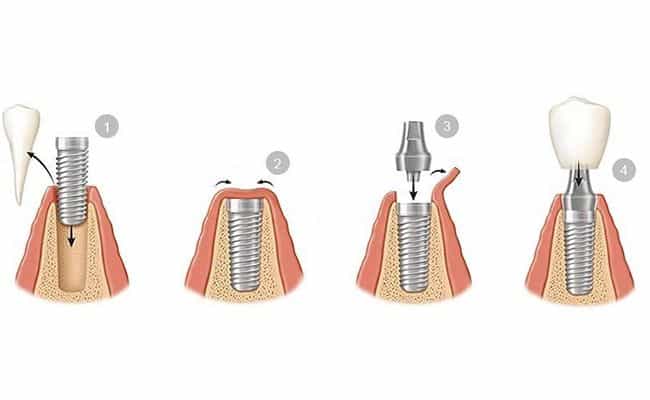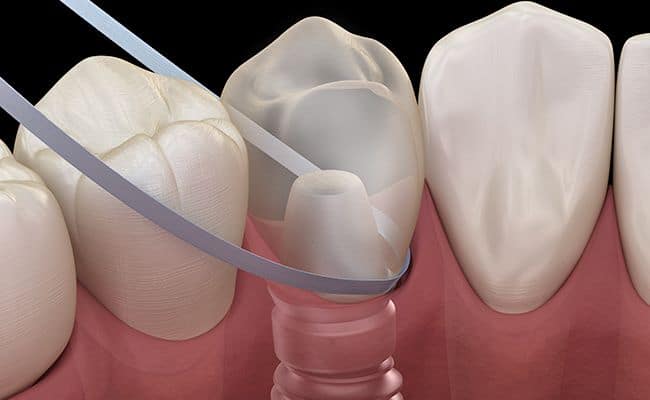A dental implant is a metallic element that is placed surgically in the maxillary or mandibular bone below the gums or gingiva. It is designed to replace the missing root and keep an artificial tooth or denture in place. It has a screw shape and it is made of titanium which is a biologically compatible material that does not produce rejection and allows its cohesion to the bone.

Dental Implants
Advantages of dental implants:
- Dental implants prevent deterioration of the healthy teeth. This deterioration may happen with the constant use of removable dentures or with teeth preparation for a fixed bridge.
- They provide excellent support and stability during chewing; something that would be impossible with other dental replacement systems.
- They increase self-esteem. Appearance and speech are improved considerably.
- By replacing the roots of the teeth, the bone is better preserved. In contrast, with conventional dentures, after a couple of years of use the bone gets reabsorbed causing discomfort by having an unstable prosthesis.
- They do not harm neighboring natural teeth. The bridges and removable prosthesis use neighboring teeth to hold in place, causing wear, cavities and the need for further work on “anchor teeth”, diminishing the long term stability of the prosthesis.
- Dental implants represent a long lasting solution in any clinical situation with a success rate of more than 90%.

For most patients, placement of the dental implants requires two phases. The first one contemplates the placement of the dental implant in the bone. The healing time in this phase varies as it depends on a number of factors, like bone hardness. Within three to six months after surgery, dental implants are gradually joining the bone under the gum. During that time, the patient may use temporary prosthesis.

Once the implant is attached to the bone, the second phase begins. The implant is uncovered and a healing attachment is added so the gingiva does not cover it again. After two weeks, the dentist takes an impression to create the new teeth. The posts or prosthetic abutment are attached to the implant, and the porcelain teeth or denture are made on them.
The two phases require four to eight months depending on the patient and the complexity of the case.
After the connection of the teeth or denture to the implants, a maintenance phase is initiated. In this phase it is essential that the patient regularly sees the specialist to properly remove bacterial plaque, do oclussal adjustments and have a radiographic follow up to find any signs of bone loss around the implant. This will ensure its long term survival. Likewise, to ensure the success of the treatment, the patient’s good oral hygiene is vital.

FAQ
Are all dental implants the same?
No, not all implants are the same, they vary depending on their design or shape, material and quality. As a consequence, the price also changes. Dr. Fernández works only with dental implants of proven quality with the objective of offering the best possible results in the long term.
What material are dental implants made of?
The great majority of dental implants of high quality are made of titanium which has the property of osseointegration, that is, joining with the bone. In addition, titanium and its alloys are the components most used in the manufacture of medical prosthesis like hip replacements.
How long does a dental implant last?
According to scientific studies, the duration of dental implants is approximately 30 years. However, their duration depends on good dental hygiene and periodic control checks performed by a periodontist.
What are the minimum and maximum recommended ages to have a dental implant procedure?
Most people can get dental implants at any age without problems. As a general rule, the patient should wait until bone growth is considered to be over, 21 years of age for men and 18 for women. However, there is no maximum age limit. One of the great advantages of implants is that they improve the quality of life in elderly patients.
How does a dental implant feel?
There is the belief that dental implants feel like a foreign body and that they do not have the same functionality or aesthetics as natural teeth. However, many people claim to feel their dental implants natural, more secure and firm than their natural teeth.
Is the implant placement painful?
The placement of the implant is performed with local anesthesia or, if desired, with intravenous sedation, so it is not a painful intervention. The postoperative is generally mildly uncomfortable if the periodontist’s recommendations are followed.
What is a rehabilitated implant composed of?
A rehabilitated dental implant is composed of the implant (or screw), a prosthetic attachment or abutment and a crown. The implant functions as the root of the tooth and makes it possible to anchor the prosthesis. The prosthetic attachment or abutment is the piece that connects the implant with the crown, which is the visible part that imitates the natural tooth.
Who should place a dental implant?
The dentist who places dental implants should be extensively trained in oral surgery and handling of soft and hard tissues, as well as having a solid knowledge of implant rehabilitation. The dentist also needs to be able to evaluate the radiological study of the area to be implanted to make an adequate treatment plan. Periodontists have training in all these areas and therefore, are most suited to place dental implants.
What factors influence the final cost of a rehabilitated implant?
Diagnosis, radiological evaluation, preparation of treatment plan, laboratory prices, cost of materials needed depending on the case (implant of titanium, membranes, bone, etc.), specialist fees and monitoring; and the cost of prosthetic devices and the crown are some of the most important factors in determining the final price of a rehabilitated implant.
Why dental implants vary so much in price from provider to provider?
It is common for many dental clinics to offer dental implants at a very low cost. However, there are often added costs such as attachments, prosthetic accessories and removal of sutures not included in the original quote. What at first may seem like a very affordable price, will end up costing more than with other specialists practitioners.
We strongly recommend to always request from your dental practitioner a final quote, everything included. Compare the final price, expertise and experience of the various providers. Make an informed decision knowing that unexpected costs will not occur and that your dental health will be in the best hands.
When can I return to my usual routine after implant placement?
Because the surgery is simple, you can return immediately to your usual routine. Basic post-operative advice should be followed, such as avoiding physical exertion for a week, exposure to heat, etc.
What can I eat after implant placement?
It is advisable to wait until the anesthetic effect disappears to start eating or drinking (at least two hours after the procedure). On the first day, it is recommended to eat a soft and cold diet, other foods and hot drinks can cause discomfort. You can start eating normally on the second day, being cautious not to use the intervened area for chewing and avoiding irritating foods such as coffee and spices for the next four days.
How are dental implants cleaned?
Dental implants, like natural teeth, accumulate food scraps that cause bacteria to proliferate. Therefore, it is very important to maintain proper oral hygiene by brushing three times a day, flossing once a day and having dental implant maintenance twice a year.
What care do dental implants require during the period of osseointegration?
It’s important to visit your periodontist to ensure the proper maintenance of the prosthesis or provisional teeth. This will prevent them from directly impacting the implant while healing the bone around it. In turn, it is advisable to avoid tobacco, as it interferes with the healing process, and medication that alters bone physiology.
What care do dental implants require after rehabilitation?
Like natural teeth, dental implants require proper oral hygiene and periodic visits with the periodontist to avoid diseases such as mucositis (inflammation of the soft tissues surrounding the implant), or peri-implantitis (infection that affects the bone and the gum). The periodotintist will also check how the prosthesis is working to prevent fracture of any components of the implants.
Do implants cause bad breath?
If the person did not have bad breath before the intervention and maintains good habits of oral hygiene, it is difficult for the dental implants to produce it afterwards by itself. However, oral factors are not the only ones that cause bad breath; other causes include stomach problems and respiratory tract infections.
What should be done if an implant loosens or moves?
If the implant is moved or loosened during the period of osseointegration, it must be removed and replaced with a new one. The attachment of the implant to the bone requires complete immobilization of the implant.
Loosening of the screw (which supports the prosthetic attachment) once the osseointegration process is complete is a common complication that has an easy solution: the screw is tightened, the proper torque is given and the implant-crown connection is re-sealed.
Can dental implants be whitened?
Crowns, unlike natural teeth, do not change color. Regardless of the material they are made of, porcelain or zirconia, they will always have the color with which they were created. If, for cosmetic reasons, the patient wants to whiten his/her teeth, it would be necessary to create a new crown according to the new color of the denture.
Will the alarm sound if I go through a metal detector with dental implants?
As dental implants are made out of titanium, there is a possibility that a metal detector will sound if a person goes through security. However, such possibility is remote because the metal content of a dental implant is very low and will depend on a number of factors, like the size and quantity, as well as the sensitivity of the metal detector.
Are there factors that contraindicate the placement of a dental implant?
Dental implants are contraindicated in people who suffer from severe heart disease or who have recently had a heart attack, are undergoing treatment for cancer (chemotherapy or radiotherapy), are receiving immunosuppressive treatment, suffer from an uncontrolled metabolic disease or taking medications that affect bone healing. In these cases, the treatment can be done later after the specific health condition is controlled and the physician has given explicit permission to receive implant treatment. In turn, there are other factors that need to be corrected before implant placement, such as periodontal disease, cavities, endodontic, occlusal and space problems.
Is there a risk of the dental implant being rejected by the body?
This is one of the most common questions patients ask when they are interested in getting dental implants. Because titanium has excellent biocompatibility with body tissues, dental implants do not cause allergy or rejection.
Can an implant be placed in a patient with osteoporosis?
Placement of dental implants is not contraindicated in people with osteoporosis. It was previously considered that low bone density could affect osseointegration of the implant to the bone. However, new techniques have been developed to promote new bone formation which make it possible to place implants in patients with osteoporosis. Nevertheless, implant placement might be contraindicated in patients under osteoporosis treatment with biphosphonates.
Can an implant be placed in a patient with diabetes?
A person with diabetes can have dental implants performed as long as his/her glycemic levels are under control. Patients with a high glycemic level are more prone to infections and to slow healing of the tissues, which can lead to treatment failure.
Can an implant be placed during pregnancy?
Placement of dental implants during pregnancy is not recommended. During gestation, hormonal changes can cause sensitivity of the gingiva and make its healing challenging. Furthermore, for dental implant planning and follow up, X-rays are required, which can affect the fetus.
Can I have an orthodontic treatment if I have implants?
Dental implants are not contraindicated for orthodontic treatments. Although the implants do not move, they can be very useful when they serve as an anchor point to move the rest of the teeth. That is why the orthodontist and the periodontist must jointly develop the most appropriate treatment plan to ensure the success of both procedures.
When are special surgical procedures (soft tissue and bone grafting) needed?
Soft tissue and bone grafts are procedures that are not performed at every implant placement surgery. However, there are times when the patient requires it to achieve the success of the implant.
When a tooth is lost, the bone supporting the tooth loses its height and thickness over time. If there is not enough bone it will be necessary to make a bone graft that will support the implant. In the same way, loss of a tooth causes the gingiva to become thin and retract, in which case a gingiva graft will also be necessary.

